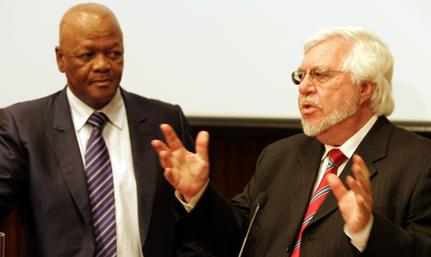Latest News Archive
Please select Category, Year, and then Month to display items
20 December 2019
|
Story Thabo Kessah
|
Photo Thabo Kessah
 Dr Deidré van Rooyen from the Centre for Development Support, Dr Jared McDonald (Department of History), Moodi Matsoso, and Bishop Billyboy Ramahlele with the mobile device.
Dr Deidré van Rooyen from the Centre for Development Support, Dr Jared McDonald (Department of History), Moodi Matsoso, and Bishop Billyboy Ramahlele with the mobile device.
In an effort to broaden the storytelling horizons and to answer to the demands of the Fourth Industrial Revolution, Community Engagement on the UFS Qwaqwa Campus recently launched the Digital Storytelling project, aimed at broadening access to good community stories.
“We have partnered with the Common Good First initiative to enhance the service that we provide as a department,” said Bishop Billyboy Ramahlele, Director: Community Engagement.
“We challenge all academics, support staff, the SRC and students in general, to take advantage of this channel to communicate their stories to the world,” he said.
Histories of royal families
“The digital documentation of the histories of the royal families in the Qwaqwa area is in the pipeline and will be conducted in partnership with the Department of History. We have come to realise that with times changing, the younger generation loses track of the precious histories, and this platform will help in preserving that,” he added.
Community Engagement coordinator, Moodi Matsoso, also revealed that space has been identified for the lab. “At the moment, we are operating on mobile digital storytelling devices, with all the necessary equipment such as tablets and cameras. However, we will soon have a fully-fledged lab on campus,” she said.
This project is co-funded by the Erasmus+ Programme of the European Union.
Minister Jeff Radebe commends UFS for measures taken to address racial prejudices
2013-10-21
|
 |
| 18 October 2013 |
Mr Jeff Radebe, Minister of Justice and Constitutional Development, last night delivered a lecture in the Prestige series of the Dean: Faculty of Law, at the Bloemfontein Campus of the University of the Free State (UFS).
In a packed hall with, among others, university students, staff and members of the judicial system, Minister Radebe said that many other academic institutions should look to the UFS when they deal with the challenges of racism in its various manifestations in their midst. “I commend the university for taking drastic measures to address the challenges of racial prejudices in its own backyard,” he said.
“Government can and must provide leadership, but it is the collective efforts of all our people that will ensure that we bridge the racial and historical divides that stand in contrast to our noble virtues as entailed in the Constitution,” the Minister said.
On the topic “Access to Justice” the Minister said that the Department of Justice and Constitutional Development has channelled more than 80% of its nearly R16 billion budget to the Access to Justice programme.
Minister Radebe talked about the reintroduction of the Sexual Offences Courts, which attests to the unrelenting resolve to eliminate the scourge of gender-based violence. “Fifty-seven of the department’s Regional Courts are being upgraded to operate as dedicated Sexual Offences courts during the 2013/2014 financial year. We believe that these sexual offences courts will help address the growing challenge of sexual offences in the country, particularly against vulnerable groups.”
The Minister also pleaded with law teachers to avail themselves to preside in the courts in our country to complement the decreasing number of presiding officers that are drawn from the attorneys’ and advocates’ profession. These services are normally rendered by the Commissioners pro bono as part of an endeavour to bring justice to all the people, including the poor.
A challenge that the UFS could help resolve,is the transformation of the legal profession. “We need to increase the number of Law students and in turn increase the number of attorneys and advocates in the pool from which we derive candidate judges,” Mr Radebe said.
The Legal Practice Bill and the transformation of the State Legal Service are the most important initiatives underway by which the Institutions of Higher Learning will make a contribution. “The Bill seeks to establish a single regulatory structure, which will be responsible for setting the norms and standards for all legal practitioners. Members of the public, as primary beneficiaries of the legal profession, will also be represented in this structure. Other important objectives of the Bill are the removal of barriers of entry to the profession for young law graduates who aspire to pursue a legal career, and the introduction of measures aimed at ensuring that fees chargeable for legal services are reasonable and within reach of ordinary citizens,” he said.
The Minister concluded: “Our courts must reflect both the race and gender demographics of our country and so must the university communities in their various capacities as a microcosm of the society we seek to build.”